Manal EL ABBOUBI, PhD
Professor, University Mohamed V, Rabat (Morocco)
Research Affiliate and Coordinator of Social Innovation Chair
ECONOMIA, HEM Research Center (Morocco)
Studies on young people in Morocco have revealed that their situation is a subject of multiple worries and overarching issues (e.g. weak impact of education and employment policies on knowledge, lack of interest in politics and of confidence in public institutions, etc.) At the same time, awareness has been growing over the past decade of the need to take young people’s expectations into consideration when designing public and private policies. According to the national case study of Morocco in the SAHWA project[1], young people’s representations, in the post-2011 context, are directed inwardly, more towards personal success than collective actions.
How could social innovation foster youth inclusion in Morocco ?
Social innovations are practices that aim to solve social needs in a better way, and/or a new way, than the existing solutions. It is a concept with some key particularities such as:
- Targeting an enlarged positive social impact
- Using collaborative practices
- Targeting Common good / Shared value
- Enabling a large Scalability
- And having a business orientation (or not)
The “Social Innovation Chair” by ECONOMIA-HEM Research Center works closely on creating collaborations with several stakeholders (private and/or public actors) so to build programs targeting young entrepreneurs, using collaborative practices and presenting a huge potential for scalability. As a laboratory of academic research with managerial orientation, the chair’s mission is to “participate in the production of knowledge on social innovations making sense for organizations and a positive impact on Society. ”
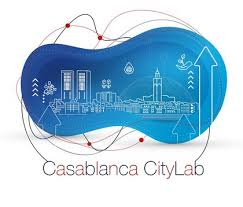
In that sense, the Social Innovation Chair launched an enthusiastic project with Lydec[2] in July 2018 called CasablancaCityLab[3]. It’s a lab that targets social entrepreneurs proposing novel solutions applied to Casablanca with a high level of social and sustainable impacts on local beneficiaries. The program aims to foster the emergence of innovative actors around issues related to inclusive and sustainable urban development in Casablanca and to strengthen the competitiveness of projects by supporting their dynamics of innovation and implementation.
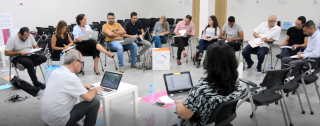 A multi-disciplinary research team was involved so to set the project terms of reference, stakeholders to be involved, project call for applications[4], training programs and follow up.
A multi-disciplinary research team was involved so to set the project terms of reference, stakeholders to be involved, project call for applications[4], training programs and follow up.
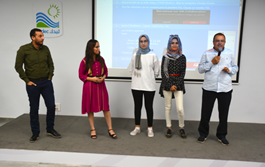 Entrepreneurs selected had followed a particular training program including designers, artists, sociologists, architects and many other challengers, that helped them:
Entrepreneurs selected had followed a particular training program including designers, artists, sociologists, architects and many other challengers, that helped them:
- strengthen their methodological, conceptual, technical and operational frameworks;
- document and disseminate innovative knowledge and know-how from competing projects;
- support and strengthen the scalability of their projects and the valorization of their social impact.
In 2019, the CasablancaCityLab supported four projects in various domains: design and fashion, school transportation, sustainable courier service and a FabLab.
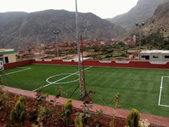 Another exciting project raising how social innovation impacts youth social and economic transition in the rural side is the example of “Tizi N’oucheg” village[5].
Another exciting project raising how social innovation impacts youth social and economic transition in the rural side is the example of “Tizi N’oucheg” village[5].
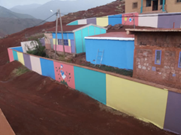 It is an interesting example showing how young rural people could be independent and engaged in their family and community life, in a sustainable way. This has been possible thanks to the mobilization of young people, to make the village completely independent and above all sustainable, whether in terms of use of natural resources (water, agriculture, sustainable construction, sustainable tourism), or in education (pre-school, school, accommodation for students admitted to university in town)[6]. According to Rachid MANDILI, the president of the association of the village, all this was the result of an internal strategy for the independence of young people, their onboarding and empowerment by giving sense to their actions, the national and international visibility of their activities and a sense of living together.
It is an interesting example showing how young rural people could be independent and engaged in their family and community life, in a sustainable way. This has been possible thanks to the mobilization of young people, to make the village completely independent and above all sustainable, whether in terms of use of natural resources (water, agriculture, sustainable construction, sustainable tourism), or in education (pre-school, school, accommodation for students admitted to university in town)[6]. According to Rachid MANDILI, the president of the association of the village, all this was the result of an internal strategy for the independence of young people, their onboarding and empowerment by giving sense to their actions, the national and international visibility of their activities and a sense of living together.
A field trip will be organized in 2021 by the University of Tampere and Economia HEM Research Center. Students and researchers participating will have the opportunity to meet young Moroccan people involved in several projects, whether at the urban or the rural side, and could discover and understand how social innovation is operated as an effective way to engage youth in social and economic life.
